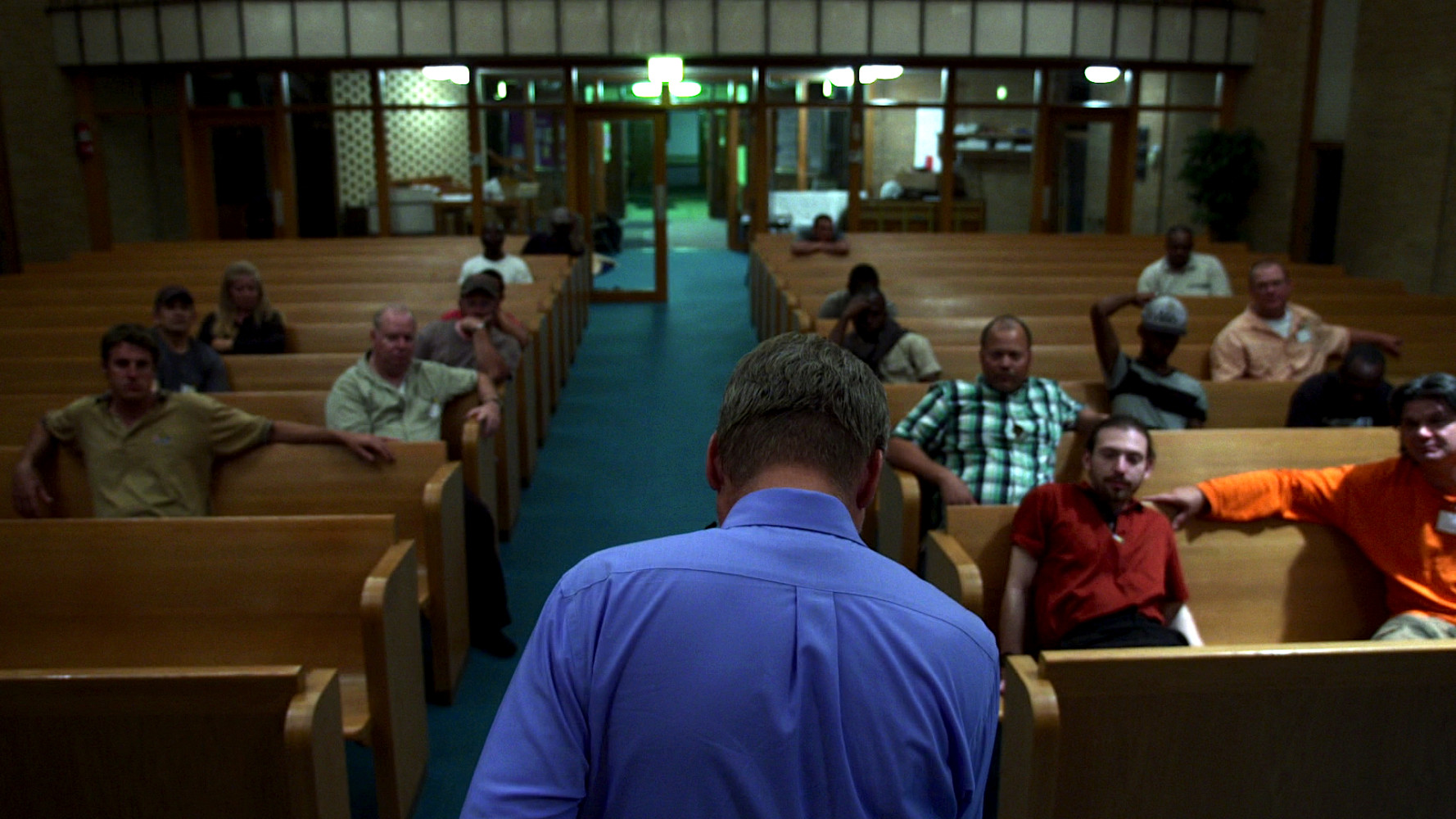Few current documentaries seem as of-the-moment as Jesse Moss’s The Overnighters, a film shot through with pulsating clarity and startling ambition. It follows Jay Reinke, a Lutheran pastor in Williston, N.D., as he faces increasing hostility from townspeople toward his “Overnighter” program, which allows out-of-state workers, drawn to the town for high-paying, dangerous fracking work, to sleep on the floor of his church if they don’t have anywhere else to go. Reinke argues that the incoming workers are gifts to be received with open arms, no matter the cost. Most people in Williston vehemently disagree.
Moss began shooting at a time when the program was already beginning to draw ire from the community, so it isn’t long before the stakes have risen exponentially, with the situation finally coming to a head when Reinke starts allowing people stay in his own home. From that point on, the film becomes largely devoted to Reinke’s seemingly endless pleading with community members on doorsteps and in council meetings. During the most chilling of these exchanges, a particularly disapproving community member expresses her belief that Reinke opening up his floor space is doing little more than “contributing to a layer in the community that doesn’t need to be contributed to.” Her argument is that once these men are in town for a few days and haven’t found work, they will simply apply for jobs at local fast food restaurants and stay in Williston indefinitely.
The story plays out in riveting detail, partially due to the fact that Moss has an almost preternatural ability to place himself near the events most pivotal to the outcome of the film. He also seems unperturbed in even the most alarming of situations: At one point, Reinke has a gun pulled on him by an angry RV lot owner, and Moss refuses to put the camera away, even with a shotgun being wagged inches from his face. And in one of the most shockingly candid and deeply disturbing scenes of any documentary in recent memory, Moss holds the frame, carefully but ruthlessly, on Reinke’s wife as her husband — in his distinct, still-vaguely cheerful pastor cadences — delivers news that will ultimately doom their marriage.
The end result is something sad, cathartic and uniquely resonant in its refusal to sand off any edges of the dark economic undercurrents enveloping America’s hinterlands.
Some might judge these kinds of moments as overly melodramatic or manipulative, but it’s nonetheless refreshing to see Moss lean into the kind of classically structured, emotionally cathartic documentary storytelling that is rarely done so well on the big screen. Watching The Overnighters, one gets a sense that Moss is not only extraordinarily good at discovering absorbing material, but fully mining the dramatic potential of such moments in a way that doesn’t disturb its carefully observant surface. Moss himself has admitted that most vérité documentaries are lucky to capture even one or two of what are typically referred to as “holy shit” moments: seismic events around which a compelling narrative can be built. The Overnighters has at least four, each of them working beautifully in concert to render an emotionally tactile impression of a community.
The ultimate strength of this film owes a good deal to the magnetism and incredibly forthcoming nature of its central figure. Reinke had no trouble granting singularly intimate access once Moss built up some trust, and he clearly wants the camera around, often taking it upon himself to play to it. Despite his ubiquitous presence, the film hardly idolizes him. Neither party is entirely right or wrong: The citizens of Williston could stand to be more understanding, sure, but the pastor’s practice is probably not sustainable, and the film is fair-minded enough to address this. Even in the face of almost certain doom, though, Reinke has a charisma about him that tends to sweep away doubts about his mission. Buttressed by a gentle depiction of the man and his family, The Overnighters possesses a tough eloquence in the way it delineates the unrecognized miseries of modern small-town American life by simply allowing its subjects to interact with each other.
The end result is something sad, cathartic and uniquely resonant in its refusal to sand off any edges of the dark economic undercurrents enveloping America’s hinterlands. Moss instead chooses to load The Overnighters chock-full of passages that, in blunt, unvarnished rhetoric, subvert the kinds of perceived notions of pastoral hospitality that have been applied to small-town America for generations. To his credit, he doesn’t shy away from the xenophobic and classist behavior Pastor Jay’s program stokes: In Williston, the dividing line between traditional notions of parochial hospitality and the long-term economic irrationality of unregulated emigration has all but dissolved. Near the film’s end, one of the wayward workers opines that part of the reason it’s so tough to make it in the oil fields is that the men who move there for that kind of work are literally going crazy because they don’t have access to much more than “males, males, males, males…hungry for money.” Even in desolate North Dakota, it seems, it’s impossible to escape the inimical influence of the Almighty Dollar without taking some heavy blows.








No Comments